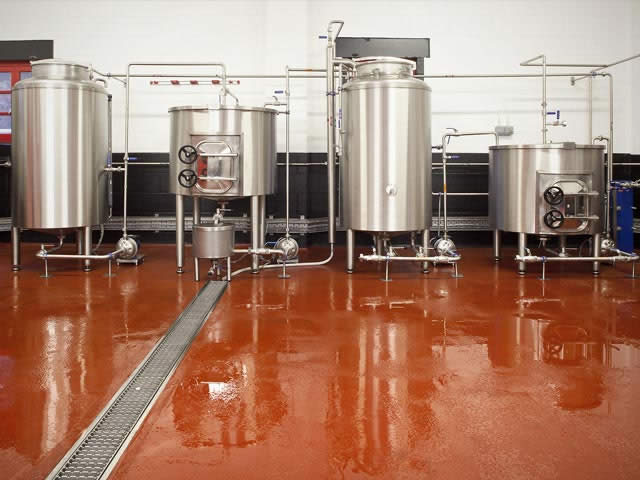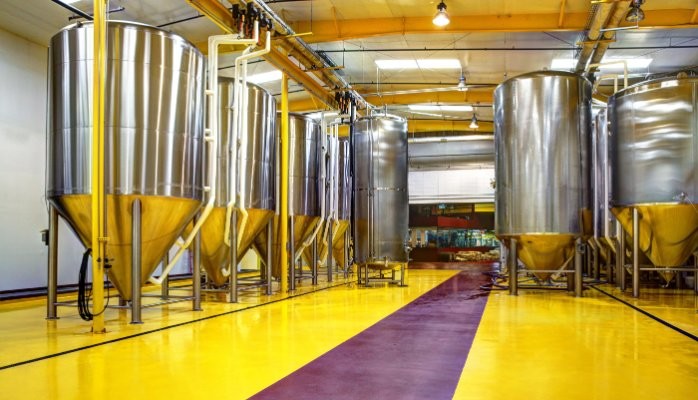Ideal Brewery floors

Brewery Flooring: A Crucial Blend of Safety, Hygiene, and Compliance
Breweries may have been spaces reserved for craft beer makers and experts in the past. Now, they are prime destinations for beer enthusiasts and holidaymakers to test new creations. With more visitors comes a greater responsibility for health and safety matters, starting with flooring.
The right flooring prevents slips, trips, and hygiene problems resulting from bacteria.
However, it’s not just a safety issue – it’s also a matter of abiding by strict regulations. It’s a legal requirement that all breweries have flooring that complies with strict sanitation mandates.
You can read on to find out more about flooring options for breweries and how a wise flooring decision could save you time and money.
What makes good brewery floors?
Brewery floors need to be capable of outlasting a range of strenuous conditions, including heavy loads, intensive foot traffic, and spillage of various liquids. Left untreated, they may absorb alcohol, release concrete dust, or end up badly damaged and ultimately unsafe. With this in mind, here’s a breakdown of the most important characteristics for a quality brewery flooring solution.
Stability
Safety is always a primary concern – and given that the average brewery gets plenty of foot traffic, it’s important to invest in a floor that won’t leave visitors prone to slipping and falling. The ideal flooring material should be suitable for wet and dry conditions.
Full coverage
Gaps and cracks in flooring can lead to significant problems for breweries, both in terms of health and safety and product quality. In fact, this is such a serious concern that strict rules and regulations have been implemented governing brewery flooring.
Moisture, acid, and chemical resistance
Craft beer creation involves mixing ingredients such as heated sugar solutions and various acids. Some of these ingredients are capable of eroding various flooring materials, leaving breweries open to sanitisation problems. By investing in tough, antimicrobial floor coating, brewery owners can avoid this problem altogether.
Temperature resistance
The process of creating craft beer involves heating ingredients to temperatures of up to 120 degrees Celsius, temperatures which would likely cause the average floor to crack or fail. It takes a special type of flooring material to resist such high temperatures.

Popular brewery floor options
Epoxy Flooring
Epoxy is popular for its strength, low shrinkage, and excellent adhesion. It is also resistant to chemicals and solvents and capable of insulating against electricity. However, some alternatives like urethane are more resistant to high temperatures, a crucial part of the brewing process.
Polyurethane Cement Flooring
Known for its excellent resistance to water and chemicals, polyurethane is commonly used in the food and beverage industry.
Polyurethane concrete sealer is an excellent choice for protecting concrete floors in breweries. It provides long-lasting protection, is resistant to chemicals and moisture, and can withstand heavy traffic and abrasions.
Methyl Methacrylate Flooring
Methyl methacrylate is an acrylic flooring created by a chemical reaction. It is a popular choice in locations with a high likelihood of objects dropping or spilling.
It is resistant to most chemicals and surprisingly strong; however, it is unsuitable for DIY jobs, as it can damage the skin, the eyes, and the mucous membranes. MMA flooring has numerous properties that have proven beneficial in the food and beverage and retail industries.
We are here to help!
Looking for a flooring option that works for your brewery and stands your business in good stead for the future? The team at Diamond Grind is here to help you find and install the perfect solution so you can get back to business.
We also offer a range of industrial, commercial and residential flooring services, including the preparation and application of epoxy flooring and polished concrete solutions. .
FAQ,s

What are the key requirements for brewery floors in NSW to ensure safety and compliance?
Brewery floors must provide stability in wet and dry conditions to prevent slips, full coverage without gaps or cracks for hygiene, resistance to moisture, acids, and chemicals from brewing ingredients, and withstand temperatures up to 120°C from heating processes. These features minimise risks in high-traffic areas and support strict sanitation regulations. For more on non-slip options, visit our Non-Slip and Epoxy Coatings page.
What types of flooring does Diamond Grind recommend for breweries?
We recommend epoxy flooring for its chemical resistance and adhesion, polyurethane cement for superior durability against abrasions and heavy traffic, and methyl methacrylate (MMA) for strength in high-risk spill areas. Each option addresses spills, temperature changes, and sanitation needs in food and beverage settings. For a comparison, read our blog post on Which is Better: Epoxy or Polyurethane Cement?.
How do brewery floors handle challenges like chemical spills and temperature fluctuations?
Our recommended floors resist erosion from acids, solvents, and heated solutions, preventing sanitisation issues and bacterial growth. They also endure extreme temperatures without cracking, ensuring longevity in demanding environments. Antimicrobial coatings add extra protection against spills absorbing into the surface.
Why choose professional installation for brewery flooring in Sydney or the Central Coast?
Professional installation ensures seamless application, optimal adhesion, and compliance with regulations, avoiding DIY risks like chemical exposure from MMA. Our team minimises downtime while delivering tough, low-maintenance surfaces. For industrial examples, check our Commercial and Industrial page.
How can I get expert advice on brewery floors in NSW?
Call Diamond Grind at 1800 587 172 for a 100% free, no-obligation consultation. We’ll assess your needs and recommend the best options like epoxy or polyurethane cement, serving Sydney, the Central Coast, and surrounding areas today!
✅ Let's Talk — DiamondGrind
100% free consultation — no commitment required.
